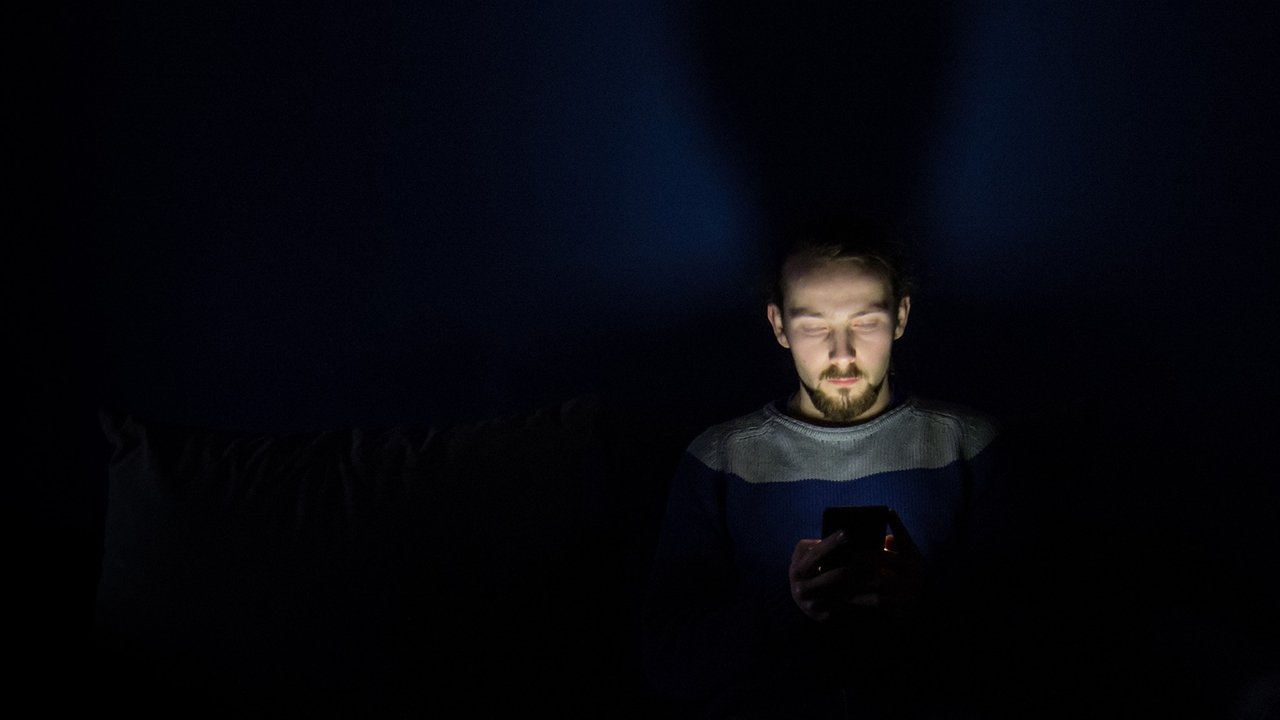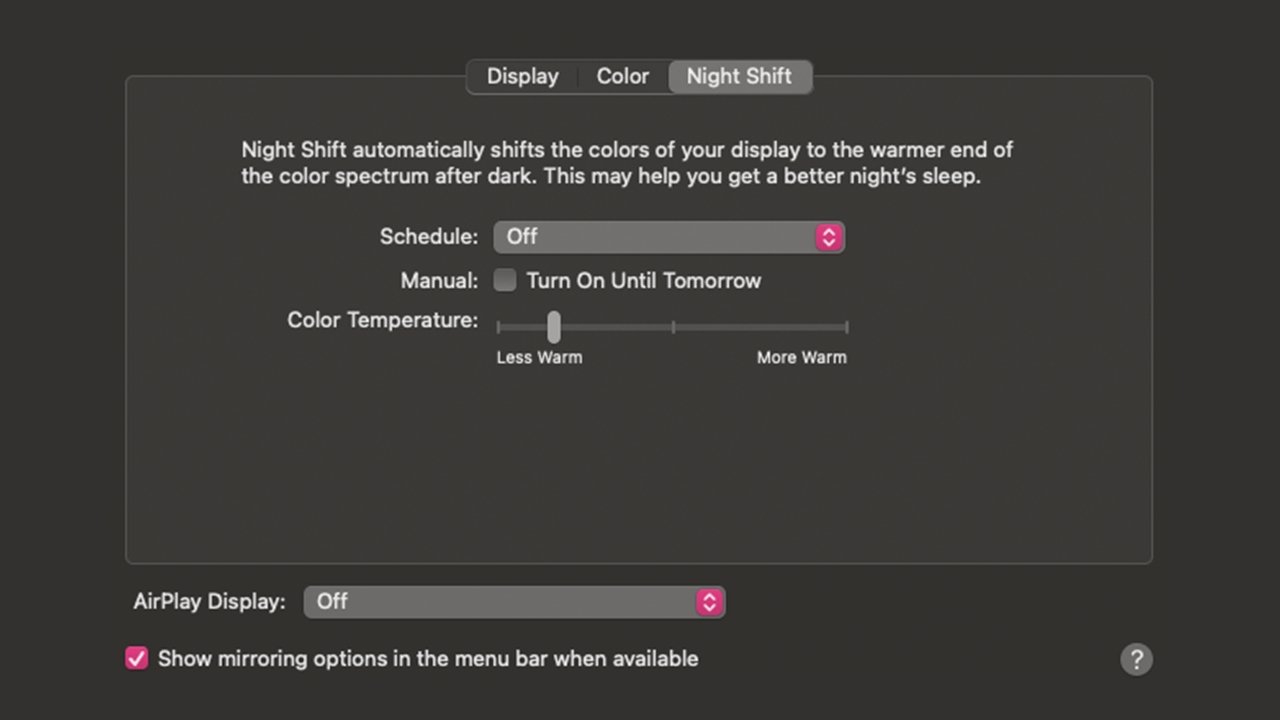New study finds that Night Shift does not improve sleep quality or quantity
A new sleep study from Brigham Young University has found that features like Night Shift do little to improve users' sleep quality over those who don't use the feature.

Features like Apple's Night Shift are designed to shift the light emitted from your devices away from the blue light spectrum. In addition to supposedly being better for your eyes, many device manufacturers also claim that this helps improve users' sleep quality.
However, a new sleep study performed by Brigham Young University challenges that claim, showing that Night Shift and similar features don't improve sleep quality or the hours of sleep an individual gets.
The study included 167 adults ages 18 to 24 who self-reported using their phones daily. The participants were asked to spend at least eight hours in bed and had to wear an accelerometer on their wrist to record their sleep.
Psychology Professor Chad Jensen and his research team divided users into three groups: those who were asked to use their phone with Night Shift turned on, those who used their phones without it, and those not allowed to use their phones before bed.
"In the whole sample, there were no differences across the three groups," Jensen said. "Night Shift is not superior to using your phone without Night Shift or even using no phone at all."

The Night Shift option in macOS
While the three groups showed no differences in sleep outcomes, the researchers grouped the participants into two groups -- those who averaged seven hours of sleep or more and those who slept less than six.
Those who slept seven hours or more saw improved sleep quality over those who used their phones, regardless of whether Night Shift was activated.
There was also no difference between Night Shift and normal phone use in the group that slept less than six hours of sleep per night.
The research suggests that the problem, the problem is stimulation, not light. Users who text, scroll, and post are often too psychologically stimulated, causing them to stay awake longer, reducing overall sleep quality.
"While there is a lot of evidence suggesting that blue light increases alertness and makes it more difficult to fall asleep, it is important to think about what portion of that stimulation is light emission versus other cognitive and psychological stimulations," said Jensen.
Those looking to improve their sleep quality should reduce the amount of time they use electronics before bed.
A similar study was done in 2019, which showed that a users phone screen brightness, not color temperature, likely played a bigger role in disrupting sleep quality.

Features like Apple's Night Shift are designed to shift the light emitted from your devices away from the blue light spectrum. In addition to supposedly being better for your eyes, many device manufacturers also claim that this helps improve users' sleep quality.
However, a new sleep study performed by Brigham Young University challenges that claim, showing that Night Shift and similar features don't improve sleep quality or the hours of sleep an individual gets.
The study included 167 adults ages 18 to 24 who self-reported using their phones daily. The participants were asked to spend at least eight hours in bed and had to wear an accelerometer on their wrist to record their sleep.
Psychology Professor Chad Jensen and his research team divided users into three groups: those who were asked to use their phone with Night Shift turned on, those who used their phones without it, and those not allowed to use their phones before bed.
"In the whole sample, there were no differences across the three groups," Jensen said. "Night Shift is not superior to using your phone without Night Shift or even using no phone at all."

The Night Shift option in macOS
While the three groups showed no differences in sleep outcomes, the researchers grouped the participants into two groups -- those who averaged seven hours of sleep or more and those who slept less than six.
Those who slept seven hours or more saw improved sleep quality over those who used their phones, regardless of whether Night Shift was activated.
There was also no difference between Night Shift and normal phone use in the group that slept less than six hours of sleep per night.
The research suggests that the problem, the problem is stimulation, not light. Users who text, scroll, and post are often too psychologically stimulated, causing them to stay awake longer, reducing overall sleep quality.
"While there is a lot of evidence suggesting that blue light increases alertness and makes it more difficult to fall asleep, it is important to think about what portion of that stimulation is light emission versus other cognitive and psychological stimulations," said Jensen.
Those looking to improve their sleep quality should reduce the amount of time they use electronics before bed.
A similar study was done in 2019, which showed that a users phone screen brightness, not color temperature, likely played a bigger role in disrupting sleep quality.

Comments
That said, for some, it is a reminder to put down the phone.
During the setup of a new device or wiped/reset device, the option to turn True Tone on/off is presented to the user. The user decides if it is on or off.
Deep sleep/delta sleep is the only truly restful stage of sleep. It’s the least active state the brain is ever in, which is when the brain itself can literally rest. This is what’s going largely missing in people with, for example, symptoms of narcolepsy and daytime sleepiness despite spending 7+ hours apparently asleep in bed.
The only way to gauge how much of each sleep stage a person is getting is to do sleep studies where you wear a ton of crap to measure your body/brain electrical activity over time. This testing itself can interfere with sleep (strange environment, covered in wires and glue), but luckily it does tend to show useful data.
It so far seems not to help determine the CAUSE for lack of deep sleep for any reason other than sleep apnea. For people like me, with little to zero stage 3/delta sleep, and NO apnea, there’s absolutely no answers to my sleep disorder (just hand me a disability status). There’s literally nothing to be done to help me because research isn’t being done to figure out what’s actually wrong (I have lots of ideas and none of it can be used to sell me new pills, so there’s no financial incentive to study it; not to mention it’s basically a challenge to our toxic culture that brought me to this extreme point, from a childhood of already struggling with sleep - no one GAF).
There is a continuing myth promoted by many people, and actual drug advertising(!!), that REM sleep is the “most restful stage of sleep”. This is FALSE. It’s anything but. Your brain is very active during dream sleep. You need it, we don’t know why, but it’s not a brain-rest stage.
In fact, we know so little about sleep as a species that the only really correct answer to the question “why do we sleep” is “because we get sleepy”.
Dark mode is the only reason I want to update iOS beyond iOS 12.x. What’s stopped me so far is fear of performance loss (which I’m getting anyway, even without OS changes, because online services are getting sluggish: looking at you, autocorrect & keyboard lag)... ...but the worst issue is the loss of Safari iCloud sync with my Macs stuck at High Sierra.
I've noticed that even the lighting companies recognize that: they'll have bulbs with a harsh, bright blueish white for kitchen use and bulbs with softer whitish light for living areas.
This is about blue light keeping you awake.
There are studies that stated blue light prevents your body's from preparing for the normal sleep rhythm and the production of melatonin that helps you sleep.
I don't know how good/accurate either study is. Sounds like the sleep one has been disproven by this latest study.
https://www.imore.com/how-use-and-customize-accessibility-shortcut-iphone-and-ipad
Choose “reduce white point”.
Now when you triple click the home button or side button (FaceID devices) you’ll have access to even lower brightness than previously available.
Great interview w/ one of the country's premiere experts on sleep:
https://www.npr.org/2018/07/20/630792401/sleep-scientist-warns-against-walking-through-life-in-an-underslept-state